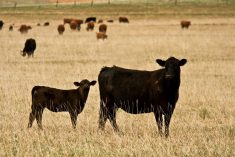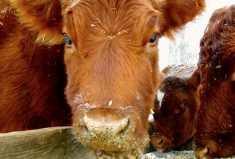Western Canadian feeder cattle prices were extremely variable over the past week which made the market hard to define. Compared to last week, yearling prices were quoted $2 to as much $6 lower while calves traded $2 lower as much as $5 higher.
While some auction crowds were caught up with the negative news coverage, other auction barns appeared to shrug off coronavirus fears. Sellers don’t appear to be altering their marketing schedules. Some cow-calf producers may be selling earlier than expected on ideas the epidemic will get worse. This behaviour may be offsetting those producers holding back on sales in hopes of an improvement.
Read Also

U.S. not ready to lift Mexican cattle ban over screwworm, Agriculture Secretary Rollins says
The U.S. is not yet ready to reopen its border to Mexican cattle amid an outbreak of the flesh-eating New World screwworm parasite, Agriculture Secretary Brooke Rollins said, but she is pleased with Mexico’s efforts to contain the pest.
Feedlot margins continue to erode with losses exceeding $200 per head in many cases and probably won’t see an improvement over the next couple of months. Short-keep cattle weighing above 900 lbs. were taking it on the chin while 800- to 900-lb. yearlings experienced limited slippage. In central Alberta, light barley ration Simmental-blended steers weighing 950 lbs. were quoted at $163; medium-flesh red mixed steers averaging 830 lbs. were quoted at 178. Heifers were all over the map, with buyers focusing on flesh levels and frame characteristics. In southern Alberta, Angus-blended heifers with medium to lower flesh weighing just under 900 lbs. were quoted at $155 while similar quality 840-lb. heifers were valued at $162. In central Saskatchewan, Charolais-based steers weighing 895 lbs. were valued at $175 and in Manitoba, steers averaging 900 lbs. traded in the $151-$155 range. The yearling market took a severe beating in Manitoba last week.
Demand for grassers was very strong last week, with the calf market recouping losses from earlier in February. The market may have felt sluggish early in the week. By Friday, there was no doubt that merchants were focused on calves with “just get ’em” type orders surfacing. In central Alberta, pre-conditioned mixed steers weighing 622 lbs. were quoted at $226 and red-white-face steers averaging 530 lbs. were reported at $241. In east-central Saskatchewan, black steers weighing 600 lbs. reached up to $230.
Cattle inventory reports from the U.S. Department of Agriculture and Statistics Canada both showed a year-over-year decline in the 2019 calf crops. We’ll probably see a marginal drop again in 2020 given the number of beef cows and retention heifers. Buyers are counting on this coronavirus pandemic to be history come fall.
— Jerry Klassen manages the Canadian office of Swiss-based grain trader GAP SA Grains and Produits Ltd. and is president and founder of Resilient Capital, specializing in proprietary commodity futures trading and market analysis. Jerry consults with feedlots on risk management and writes a weekly cattle market commentary. He can be reached at 204-504-8339 or via his website at ResilCapital.com.













